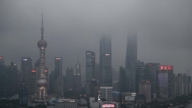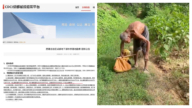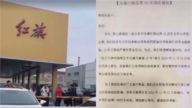【新唐人2013年05月08日訊】來自剛剛閉幕的中國進出口商品交易會(廣交會)數據顯示,在這次「廣交會」上,中國主要貿易夥伴的訂單有所下滑,這是3月份出現貿易逆差後,中國面臨的另一次貿易形勢。在拉動中國經濟「三駕馬車」中,外貿這個龍頭產業,經過前一段持續的停滯不前,真正開始了反向拉動。對於已經習慣於貿易順差的中共,這種不同尋常的貿易逆差代表甚麼﹖請看專家解讀。
「廣交會」網站週日公布,本屆交易會出口成交355億4千萬美元,同比下降1.4%。
其中,對日本和東盟的成交同比,分別下降了12.6%和6.5%。對歐盟和美國的成交同比分別下降了4.9%和0.5%。成交訂單中,3個月以內的短單佔48.6%,3-6個月的中單佔35.1%。
大陸經濟學家茅於軾:「因為外國有競爭,中國的勞動工資提高了,成本也提高了,像越南這些國家,他們就有優勢了,有些訂單轉到他們那兒去了,這也是中國的必由之路,你不能老靠低的勞動成本來做生意,中國的勞動成本提高,在我看是好事,貿易是平衡最好,沒有順差,沒有逆差,因為你要順差,別的國家就是逆差。」
「北京師範大學」工商管理碩士(MBA)導師段紹譯指出,如果偶然出現逆差是正常的,但是如果長期逆差下去,那就更不利了。
北京師範大學工商管理碩士導師段紹譯:「訂單下降一方面說明中國的出口優勢在減少,第二方面,因為中國本來就不應該出口這麼多東西,因為這匯率不是市場上的,而是因為人為的政府上的管制,才使匯率維持在一個固定的水平,使這個出口上表面上賺錢了,但實際上他沒賺錢,是竊取了國內的廉價勞動力和資源,這種長期的出口增長不是一件好事。」
從中國海關公布的數據來看,中國出口額同比增速一直減緩,今年三月的貿易數據從1-2月份的23.6%放緩到10%,並出現了8億8千萬美元的貿易逆差。在拉動中國國民經濟的「三駕馬車」之中,外貿作為龍頭,從延緩經濟增長的節奏,演變成了實實在在的負拉動。
美國南卡羅萊納大學艾肯商學院教授謝田:「中國是以鼓勵出口,廉價出口,以出口為導向來帶動經濟。實際上逆差的出現在中國是不太尋常的,中國基本上一直是享有順差的,但是這個逆差的出現,就說明中國的出口市場繼續萎縮。正常國家順差和逆差基本上是交替進行的,不會長期的順差或逆差,實際上中國長期的順差給世界經濟帶來了許多的不公平。」
不過謝田也表示,中共不會容許貿易逆差的長期出現,很有可能用限制進口的方式,來減少貿易逆差。
謝田還指出,中國長期的貿易順差已經造成了3萬億美元的外匯儲備,而這些錢主要用來購買外國債券。
謝田:「中國3萬億美元的外匯儲備,實際上不是像正常國家用來支付貿易逆差的,是中共在攫取掠奪人民的財富,把它轉換到自己可以支配的財富,這樣一個做法。」
有報導指稱,中國3月份出現貿易逆差預示著內需回升。
謝田:「實際上內需部分,中國老百姓的購買力,中國人民的財富已經被中國的特權階層搜刮得乾淨了,被中國的通貨膨脹吃掉了,所以它的內需市場沒有,基建投資泡沫即將破滅,而出口市場在衰退,所以中國經濟一定是限於停頓之中。」
《美聯社》4月10號報導說,3月份單月的出口增幅從前兩月的23.6%滑落至10%。這可能會給中國共產黨新一屆領導人帶來更多挑戰。
而分析人士普遍認為,公布的數據還不夠真實,懷疑企業謊報或政府篡改。
香港券商「靈獅控股」董事總經理藺常念說,根據已知的香港船運量,出口漲幅可能低於官方公布的數據。藺常念表示: 3月份的出口漲幅可能是2%或3%,而不是10%。
謝田也指出,中國的貿易夥伴經濟都在衰退,中國不可能在三月份賣掉了這麼多東西,謝田表示,真實數據披露出來的話,貿易逆差應該大的多。
採訪編輯/劉惠 後製鍾元
Orders Number Declined In Foreign Trade
The just-concluded China Import and Export Fair (Canton),
data showed orders declining from
China’s major trading partners.
It is another trade situation that China is facing after
the trade deficit in March.
In China’s economic troika, the foreign trade, as a leading
industry, pulled the economy backwards after some stagnation.
For the Chinese Communist Party (CCP) used to a trade surplus,
what does the trade deficit mean?
Let’s look at experts’ interpretation.
Canton Fair website announced on Sunday: “In this fair,
export turnover was 35.54 billion U.S. dollars, down 1.4%.
Year-on-year turnover with Japan and ASEAN
were down 12.6% and 6.5%, respectively.
Year-on-year turnover with the European Union and the
United States decreased by 4.9% and 0.5%, respectively.
In the turnover orders, short orders of three months accounted
for 48.6%, medium orders of 3-6 months accounted for 35.1%.”
Mainland economist Mao Yushi: “Because of foreign
competition, China’s labor wages increased, as well as costs.
Countries like Vietnam have the advantage.
Some orders went to them.
It is the only way for China, you can not always rely on
low labor costs to do business.
Cost in China increases, which I think is a good thing.
Trade balance is the best;
No surplus, or deficit, because if you have surplus,
other countries has a deficit."
Duan Shaoyi, advisor of MBA in Beijing Normal University
pointed out if there is deficit by chance, it is normal.
If the deficit is long term, it is more disadvantageous.
Duan Shaoyi: “The drop in number of orders shows
China’s export advantage is diminishing;
On the other hand, China should not export so many goods,
since the exchange rate is not based on the market.
It is an artificial control of the government,
which maintains the exchange rate at a fixed level.
So the export gains money on the surface,
but actually it doesn’t.
It is stealing the country’s cheap labor and resources.
Such long-term growth is not good."
Based on the data released by China Customs, China’s exports
year-on-year growth has been slowing down all the time.
The trade data for March this year was slowed to
10% from 23.6% in January and February.
it showed a trade deficit of U.S. $ 880 million.
Among the troika driving China’s national economy, foreign
trade is leading, slowing down economic growth to a negative.
Professor Xie Tian, in Business School of University of
South Carolina- Aiken: “China encourages cheap exports to boost the Chinese economy with export.
The emergence of the deficit is not common in China.
China has been enjoying a surplus, but the emergence of this
deficit shows that China’s export market continued to shrink.
Normally, surpluses and deficits will often appear alternately
in a country, and will not have long-term surplus or deficit.
China’s long-term surplus brought a number of unfair
situations to the world."
Xie Tian also said that the CCP will not allow long-term trade
deficit. It is likely to restrict imports to reduce the trade deficit.
Xie also pointed out that China’s long-term trade surplus
has caused US$ 3 trillion in foreign exchange reserves,
and the money generally used to buy foreign bonds.
Xie Tian: “China’s US $ 3 trillion foreign exchange reserve,
is not like a normal country to pay for the trade deficit.
It is the CCP seizing and plundering the wealth of people,
and converting it to the wealth that they can control. It is such a practice."
Reports said that China’s trade deficit in March indicates
that domestic demand had picked up.
Xie Tian: “The domestic demand,
the purchasing power of the Chinese people,
the Chinese people’s wealth had all been plundered
by China’s privileged class, consumed by China’s inflation,
so the domestic market does not exist.
The infrastructure investment bubble is about to burst,
while export markets are in recession.
China’s economy must be in a standstill."
On April 10th Associated Press reported that in March,
single-month export growth slipped to 10% from 23.6%
in the previous two months.
It may bring more challenges for the new CCP leaders.
Analysts generally believe the data released is not that honest.
They suspect business misrepresentation or CCP tampering.
Managing Director Lin Changnian of the Greyhound Holdings,
a brokerage in Hong Kong said that based on the known amount
of shipping, the export growth may be lower than the official data.
Lin said, in March, exports may rise 2% or 3%, instead of 10%.
Xie also pointed out that China’s trading partners
are all in recession, so China cannot sell so much in March.
Xie Tian said that if the real data was disclosed,
the trade deficit should be much larger.































